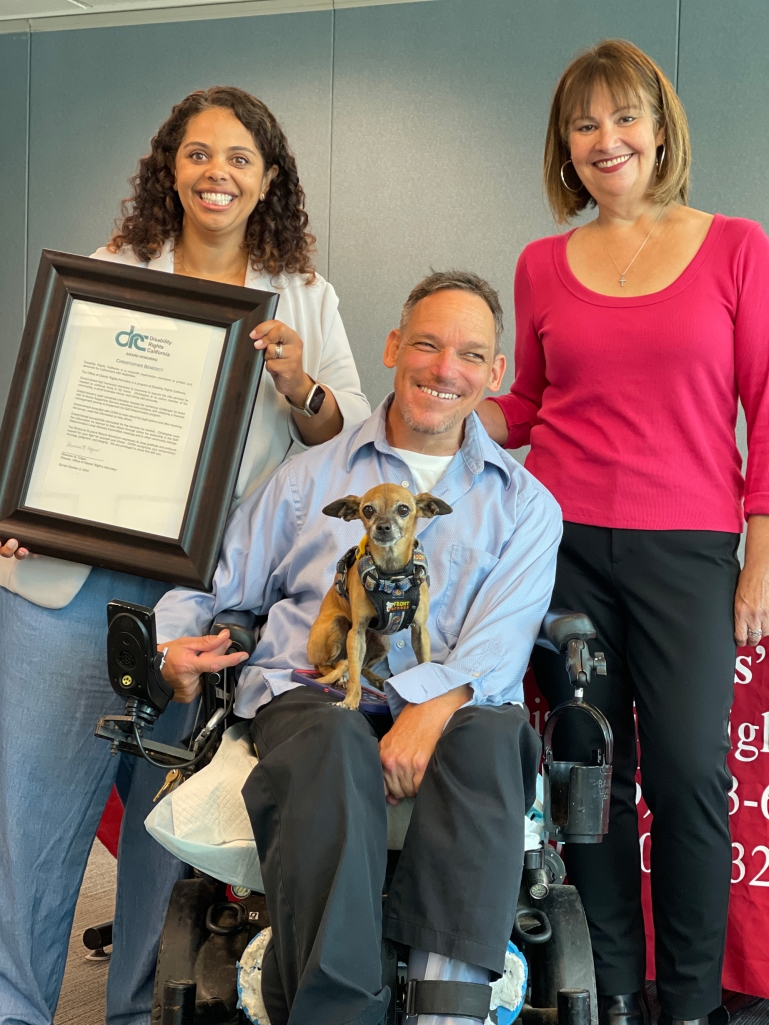2024 Annual Report - Disabled Individuals and Families Across California Defend Their Rights and Livelihoods

2024 Annual Report - Disabled Individuals and Families Across California Defend Their Rights and Livelihoods
Breakthroughs Disabled Individuals and Families Across California Defend Their Rights and Livelihoods
Below are powerful stories of individuals and families across California who are fighting for their lives. While these stories show the empowering ways self-advocacy can lead to real, tangible impact, they also reveal the deep injustice embedded in our systems. The extent to which individuals and families must fight for basic resources is unfathomable. This is why OCRA’s support is critical.
The Office of Clients’ Rights Advocacy (OCRA) is a program within Disability Rights California that provides free legal information, advice, and representation to individuals with developmental disabilities who receive services through California’s 21 regional centers. Since 1999, OCRA has placed a Clients’ Rights Advocate (CRA) at each regional center to help protect the rights of clients and ensure they receive the services they need.

Daniel Orange Fights to Restore His Benefits with the Social Security Administration, and Wins
Daniel Orange, a regional center client, received a letter from the Social Security Administration (SSA) claiming he had been overpaid $32,157 due to earnings above the Substantial Gainful Activity (SGA) limit. The SGA sets the amount of income a person can earn in a month before they are no longer eligible to receive Supplemental Security Income (SSI) or Social Security Disability Insurance (SSDI) payments. As a result, Daniel’s benefits were withheld, and he was no longer receiving SSI. Daniel and his mother contacted OCRA for help.
OCRA worked with Daniel’s employer to complete a Work Activity Questionnaire, showing that Daniel received a 20% wage subsidy, bringing his countable income below the SGA limit.
Breakthrough
OCRA submitted an appeal to SSA and persistently followed up, even encouraging Daniel’s mother to contact her congressional representative when the appeal stalled. That outreach helped push SSA to act. Finally, after almost a year of not getting benefits, SSA reversed its decision, reinstated Daniel’s benefits, and issued a back-payment of $15,800. The $32,157 overpayment was removed, giving Daniel the financial stability to pay bills and buy food again.

Peter’s Family Challenges a Denial and Protects Their Son’s Benefits
Peter is 14 and lives with his parents. Peter was denied SSI benefits because Social Security determined his parents’ home in Ukraine was an available resource. Peter’s parents explained to Social Security that their home was in the Russian–Ukraine war conflict area, so it is not available as a resource. Social Security still denied Peter’s SSI benefits. Peter’s parents contacted OCRA. OCRA researched Social Security’s rules about available resources.
Breakthrough
OCRA found a Social Security policy stating that properties in the Russian–Ukraine war conflict area cannot be counted as an available resource. The policy also instructs applicants on how to fill out a form to show that the property is not an available resource. Based on this, Peter’s father turned in that form, the policy document, and an appeal form to Social Security. Peter’s father plans to share this policy with other families with property in Ukraine.

Yuri’s Mother Speaks Up and OCRA Helps Secure a Safer School
Yuri faced severe bullying by other high school students throughout his entire 9th grade year and into the beginning of 10th grade. The bullying included both physical violence and verbal abuse. Yuri’s mother speaks an Indigenous language. Despite her language barrier, she brought the bullying to the school’s attention. Unfortunately, the school staff minimized the incidents and failed to properly address the bullying. Yuri feared going to school and was so traumatized that he eventually stopped going altogether. Yuri’s mother got counseling through a private mental health provider to help her son. She also asked for the school to locate a more appropriate placement. The school refused to locate a new school placement for Yuri and instead encouraged Yuri’s mother to find a placement on her own. The school also refused to provide transportation to any new school placement. OCRA represented Yuri at an Individual Education Program (IEP) meeting. An Individualized Education Program (IEP) is a legal plan for students with disabilities that outlines the support and services they are entitled to receive in school.
Breakthrough
At the IEP meeting, OCRA advocated for the school district to find a new school placement, provide transportation, conduct a mental health assessment, and provide compensatory education for the time that Yuri was not attending school. Yuri is now attending a new school and is doing well. The school district is also providing transportation. OCRA continues to work with the school district to complete the mental health assessment and determine what compensatory education services the school will give him.






